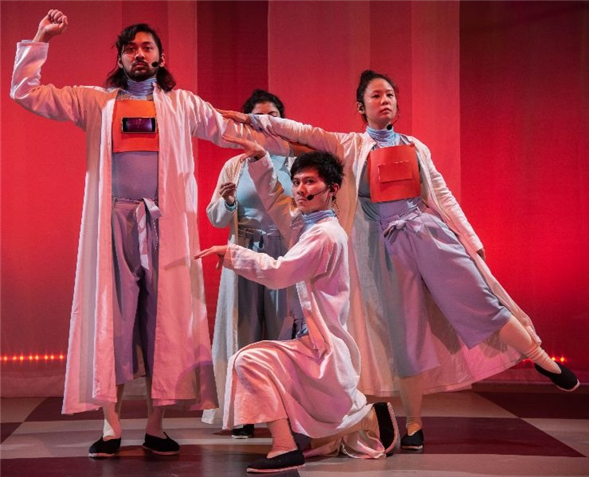Translate Page

A new physical theatre piece turns the Talmud into a butt-kicking adventure
---
What do an ancient Jewish holy book and Chinese kung fu flicks have in common? More than you might realize according to writer and director Jesse Freedman. "A couple of years ago, I was watching a kung fu movie and I thought, this reminds me of the Talmud!" he recalls. That unexpected epiphany planted the seed for The Talmud, Freedman's new theatrical romp at Brooklyn's The Doxsee, which fuses the title text and martial arts tropes with modern dance and projections. Produced by Meta-Phys Ed., which Freedman cofounded in 2011, The Talmud encapsulates the company's mission to "create original performance works that explore the relationship between religion, spirituality, culture and politics."
Raised in a Jewish household, Freedman grew up listening to stories from the Talmud. Although it's essentially a collection of Jewish laws with annotations and opinions from thousands of rabbis, it also features figures with seemingly superhuman powers, such as a rebbe who can jump a mile. With The Talmud, Freedman wanted to find a way to dramatize the text's intellectual battles so they'd be as exhilarating as the physical ones.
"People tend to shy away from all the legal code," Freedman explains, but he found "the rhetorical virtuosity of how these people make their arguments," fascinating. "Sometimes it's comic and they're trying to one-up each other," he says. "Sometimes there's friendly arguments between these sagely figures that turn very violent."
That's where the kung fu comes in. According to Freedman, in martial arts movies there's typically a challenger to the status quo who initiates a fight. That mirrors how arguments are structured in the Talmud. "It's usually an unnamed person in an academy who asks a question that challenges the Mishnah," he explains. "Then other people respond."
Admittedly, Freedman's concept is easier to grasp in action than in description. That's what actor Jae Woo discovered while working on the show. "I had a very tough time understanding what the hell I was saying or doing for the first half of the rehearsal process," says the Korean-American actor with a chuckle. But it all made sense once they added the choreography, which was devised by Freedman and the four-member cast. "The movement carries the energy of what the text is trying to say," Woo explains. Although the actors don't do any actual kung fu, a mix of modern dance and hip-hop is used to simulate one-on-one fights as well as all-out brawls.
During the show's development process, Freeman identified additional parallels between his source inspirations. Both the Talmud and kung fu are "oral traditions that were transmitted from teacher-student/master-disciple over many generations," he says. They also explore the issue of invasion and displacement, and how to keep the culture going. As Freeman puts it, stories of "our temple or our monastery has just been destroyed. We are now in exile and we have to reinvent the tradition and keep it alive."
Woo has found these commonalities compelling as well as illuminating. (And he's not alone -- there are reasons the Talmud has become a bestseller in South Korea.) "I often think that conversation and confrontation are the keys for us to enlighten each other and to enhance our understanding of what is right and wrong," Woo says. Like the rabbis who debated the meaning of the laws for centuries, "what's important isn't finding the truth, it's the pursuit of the truth. Through that, our knowledge of the world we live in only expands."
---
TDF MEMBERS: At press time, discount tickets were available for The Talmud. Go here to browse our current offers.
Follow Diep Tran at @DiepThought. Follow TDF at @TDFNYC.
Top image: The workshop cast of The Talmud at The Exponential Festival this past January. Photos by Jenny Sharp.